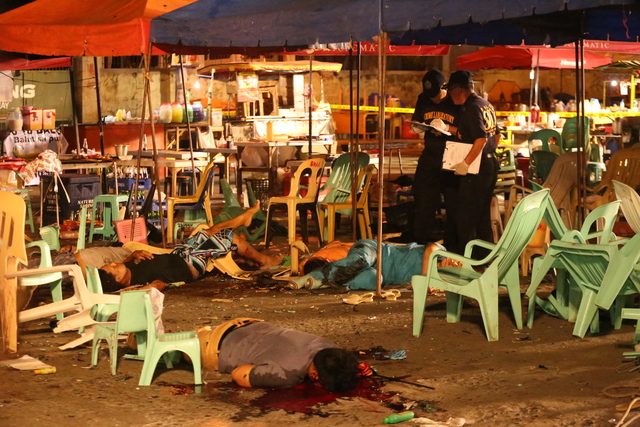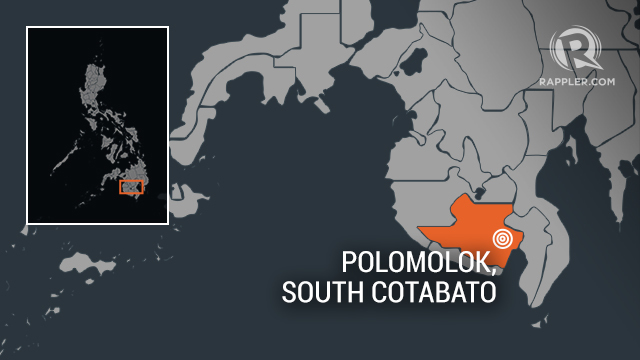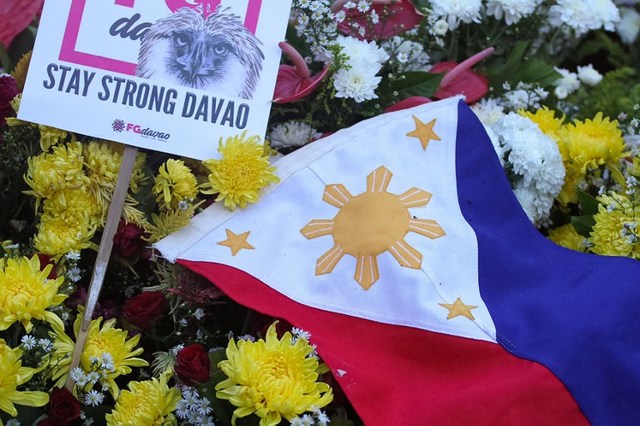From the Mindanao Examiner (Sep 4):
CIA behind Philippine bombing: Rebels
Philippine rebels on Sunday have blamed the U.S. Central
Intelligence Agency and rightist groups opposed to President Rodrigo Duterte’s
rule for the deadly bombing in Davao
City that left dozens of
civilian casualties.
Siegfried M. Red, a spokesman for the Communist Party of the
Philippines,
said the CIA instigated the September 2 bombing of a crowded night market along
Roxas Avenue
that killed at least 14 people and injured over 60 others.
Police and military investigators found fragments of mortar
bomb in the area and bolstered suspicion that an improvised explosive device
was used in the attack in Duterte’s hometown.
“The bombing was carried out and masterminded by no other
than the world’s greatest terrorist – the US imperialist hegemony which is
threatened by the Duterte government’s positive gestures toward the country’s
anti-imperialist revolutionary forces and Duterte’s consistent pronouncements
against U.S. intervention in Philippine affairs,” Red said in a statement sent
to the regional newspaper Mindanao Examiner.
“The heinous attack in downtown Davao City, home to
Philippine President Rodrigo Duterte, was clearly the handiwork of peace
saboteurs, ultra-rightists AFP (Armed Forces of the Philippines) cliques, and
big drug lords — all anti-Duterte forces that conspire with U.S. imperialism to
subvert the Duterte government. The September 2 bombing is wrought by the
bloody hands of the U.S.
war machinery’s black operations,” he added.
Red said initial the attack had the signature of the CIA.
“It is hardly coincidental that initial investigations have
found similarities on the explosion device used on
Friday’s bombing to the explosives found in the wreck of CIA agent
Michael Meiring’s hotel room in Davao City and the ones used in the Davao
International Airport and the Sasa Wharf bombings in March and April 2003
respectively,” he said.
Red was referring to the American national who was wounded
in an accidental explosion while assembling improvised bombs at Evergreen Hotel
in May 2002. Meiring, who had links with Muslim rebel groups in Mindanao, was
rescued by U.S. agents from
the Davao Medical Mission
Hospital and
smuggled out of the country in a private plane.
He said: “Duterte himself, has been a witness to how the U.S. terrorist network and its puppet fascist
reactionary wreaked havoc in Davao
City more than a decade
ago. Disgruntled junior officers of the AFP divulged that the US-Arroyo regime
masterminded the (previous) bombings that killed 38 and wounded 180 people.”
The Abu Sayyaf has claimed responsibility for the bombing,
but later on denied as behind the attack. It earlier threatened to attack
military and civilian targets and said the Abu Sayyaf will bring the war on
Duterte’s soldiers.
Red also alleged that the CIA is backing the Abu Sayyaf to stir
anti-Muslim sentiments in the Philippines.
“A CIA-backed terrorist group was quick to admit its responsibility in the
bombing, a scripted rejoinder to sow further enmity against majority of Muslims
who want just peace. U.S.
imperialism has always employed terror tactics to stir anti-Muslim sentiments
and prelude its greater military intervention in countries that challenge its
dominance and exploitation,” he said.
He said Washington and its rightist and militarist cliques
in the Philippines
are opposed with Duterte’s peace talks with the communist rebel group New
People’s Army and its allies, the Moro Islamic Liberation Front and Moro
National Liberation Front.
“Clearly, US imperialism and its rightist and militarist
cliques in the country are not happy with how the Duterte government is shaping
its pro-peace governance as shown in the great strides in the peace
negotiations between the Philippine government and the National Democratic
Front, and as demonstrated by Duterte’s peace overtures with the MNLF and
MILF,” Red said.
He said communist rebel forces are supportive of Duterte’s
peace process and ready to fight U.S.
intervention and peace saboteurs in the Philippines. “The CPP supports the
resounding call of the Filipino people for a just and lasting peace. It is
prepared to command the Red fighters and enjoin all revolutionary forces to
defend civilians against attacks from US war hawks, peace saboteurs, rabid
rightist cliques of the AFP and PNP, and other fascist enemies of the people,”
Red said.
There was no immediate statement from the U.S. Embassy or
the Philippine government on these allegations, but Filipino journalists also
received text messages from their cell phones, saying the CIA was behind the
bombing to sabotage Duterte’s peace efforts.
“Good evening everyone, I do not believe the Davao bombing was ASG
(handi)work. May(roon) earlier warnings daw to the younger (Davao City Mayor
Sarah Duterte-Carpio and Vice Mayor Paolo) Dutertes. Pag ASG, I am sure di na
mag-warning pa. I think there is now a rightist operation aided by the CIA to
sabotage PRRD (President Rodrigo Roa Duterte). There might be more (bombings)
in the near future,” the message said, which came from an unknown person.
Duterte has declared a state of lawless violence in the Philippines
following the bombing. And Washington quickly
condoled with the families of the victims and offered to assist the Philippines in
the investigation into the attack.
“The United States
offers deep condolences to the families and other loved ones of the victims of
the explosion in the Philippines’ Davao City,
and our thoughts and prayers are with the injured,” said U.S. National Security
Council spokesperson Ned Price. “We understand that local authorities continue
to investigate the cause of the explosion in the night market, and the United States
stands ready to provide assistance to the investigation.”
But Duterte rejected the U.S. offer to help in the
investigation, saying, the local police can handle the probe. The President,
who inspected the site of the bombing before sunrise, allayed fears by some
sectors that his declaration of state of lawless violence would result to
indiscrimitae arrests and human rights violations.
“It’s not martial law, but I am inviting now the Armed
Forces of the Philippines,
the military and the police to run the country in accordance with my
specifications. Simula ngayon, I am declaring now, lahat, state of lawless
violence – it’s not martial law, no such thing until – there is a threat
against the people and against the nation,” he told reporters covering the
situation in Davao.
The mayor said they will not be terrorized by the attack and
called on the locals to unite and remain vigilant. “We will not be terrorized
by this heinous crime and I call on all Dabawenyos to unite and let us help
each other rise from this senseless incident. Let us remain vigilant, please
report any and all suspicious activity, no matter how insignificant it may
seem,” Carpio said.
Governor Mujiv Hataman, of the Muslim autonomous region, has
condemned the attack and branded the Abu Sayyaf as “the biggest traitor of
Islam.”
“We are no strangers to such incidents, and we know the fear
and sorrow that come with these tragedies. We are one with Davao City
in this time of grief. In the fight for peace, we will not falter.”
“Acts of terror have no place in a country that tirelessly
hopes for peace and stability. Time and again, this group has proven to be the
biggest traitor of Islam, their activities are purely betrayal of the values
and principles we hold dear as a peace-loving people,” Hataman said, adding,
Islam does not condone the “spilling of blood” and that the murder of innocent
people has no place in Islam.
http://mindanaoexaminer.com/cia-behind-philippine-bombing-rebels/







